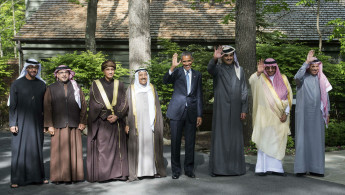Camp David Summit: Arab solution to Iran crisis
Camp David Summit: Arab solution to Iran crisis
President Barack Obama pledged an "ironclad commitment" to Gulf Arab leaders, and assurances that a deal with Iran would not leave them vulnerable.
3 min read
Only two of the GCC states sent their leaders to the summit (AFP)
The US administration has made clear that it is "not willing to intervene militarily" in Iran, and has made that clear to Gulf states at the Camp David Summit, sources told al-Araby al-Jadeed.
The summit's preliminary meetings included detailed discussions of US-Gulf security cooperation and early warnings for threats. US officials are said to have insisted that a final agreement on the Iranian nuclear programme by the end of June would lead to a change in Iranian society, and that policy would change as a result of opening up to the West and the flow of capital to Iran.
US officials spoke at length in an attempt to assure their Gulf counterparts, saying that the US would "do everything to prevent Iran from acquiring nuclear weapons".
They did add that even without nuclear weapons Iran was capable of "destabilising the region and threatening its security", but added that "Iran is part of the region" and there "must be a mechanism for dialogue and negotiation to reach solutions".
The Gulf delegation suggested the establishment of a follow-up committee for the summit and holding more US-Gulf meetings.
The Emirati embassy stated that Gulf leaders wanted reassurances to be written and signed by the US administration.
During the preliminary meetings, the US made clear that it was working with its GCC partners to protect them and ensure the "free flow of energy and commerce, and freedom of navigation", while planning to keep its military forces in the region, as "Gulf countries cannot face such challenges alone".
Syria and Yemen were also on the agenda, with US officials saying that there must be a mechanism to "end the suffering of the Syrian people and find a political solution for the transition of power and an end to extremism".
On Yemen, US officials pointed out the importance of the Yemeni government, currently based in Riyadh, being able to return to Yemen.
The new Saudi crown prince, Muhammed Bin Nayef, and deputy crown prince Muhammed Bin Salman, were reportedly flexible and did not show any intransigence regarding thorny issues.
Barack Obama invited several top level officials to the meetings, including vice president Joe Biden, secretary of state John Kerry, secretary of defence Ashton Carter, treasury secretary Jack Lew, secretary of energy Ernest Moniz, CIA chief John Brennan, National Counterterrorism Center director Nicholas J. Rasmussen, and other senior officials from the White House and the NSA.
Sources added that due to the large number of items on the agenda, the delegates were divided into smaller groups to discuss the different issues based on their areas of expertise.
The summit's preliminary meetings included detailed discussions of US-Gulf security cooperation and early warnings for threats. US officials are said to have insisted that a final agreement on the Iranian nuclear programme by the end of June would lead to a change in Iranian society, and that policy would change as a result of opening up to the West and the flow of capital to Iran.
US officials spoke at length in an attempt to assure their Gulf counterparts, saying that the US would "do everything to prevent Iran from acquiring nuclear weapons".
They did add that even without nuclear weapons Iran was capable of "destabilising the region and threatening its security", but added that "Iran is part of the region" and there "must be a mechanism for dialogue and negotiation to reach solutions".
The Gulf delegation suggested the establishment of a follow-up committee for the summit and holding more US-Gulf meetings.
The Emirati embassy stated that Gulf leaders wanted reassurances to be written and signed by the US administration.
During the preliminary meetings, the US made clear that it was working with its GCC partners to protect them and ensure the "free flow of energy and commerce, and freedom of navigation", while planning to keep its military forces in the region, as "Gulf countries cannot face such challenges alone".
Syria and Yemen were also on the agenda, with US officials saying that there must be a mechanism to "end the suffering of the Syrian people and find a political solution for the transition of power and an end to extremism".
On Yemen, US officials pointed out the importance of the Yemeni government, currently based in Riyadh, being able to return to Yemen.
The new Saudi crown prince, Muhammed Bin Nayef, and deputy crown prince Muhammed Bin Salman, were reportedly flexible and did not show any intransigence regarding thorny issues.
Barack Obama invited several top level officials to the meetings, including vice president Joe Biden, secretary of state John Kerry, secretary of defence Ashton Carter, treasury secretary Jack Lew, secretary of energy Ernest Moniz, CIA chief John Brennan, National Counterterrorism Center director Nicholas J. Rasmussen, and other senior officials from the White House and the NSA.
Sources added that due to the large number of items on the agenda, the delegates were divided into smaller groups to discuss the different issues based on their areas of expertise.



